

HarvardX and MITx: Two Years of Open Online Courses Fall 2012-Summer 2014 by Andrew Dean Ho, Isaac Chuang, Justin Reich, Cody Austun Coleman, Jacob Whitehill, Curtis G Northcutt, Joseph Jay Williams, John D Hansen, Glenn Lopez, Rebecca Petersen. Andrew Dean Ho Harvard University; Harvard University - HarvardX Isaac Chuang Massachusetts Institute of Technology (MIT) - Office of Digital Learning Justin Reich Harvard University - HarvardX; Harvard University - Berkman Center for Internet & Society Cody Austun Coleman Massachusetts Institute of Technology (MIT) - Electrical Engineering and Computer Science Jacob Whitehill Harvard University Curtis G Northcutt Massachusetts Institute of Technology (MIT) Joseph Jay Williams John D Hansen.
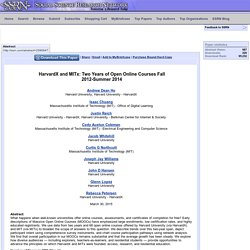
Who Do You Connect With? Cultivating Your Personal Learning Environment - AACE. ‘As the future connects us, how are we handling it?
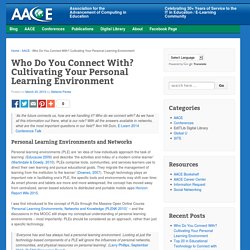
Who do we connect with? As we have all this information out there, what is our role? With all the answers available in networks, what are the most important questions in our field?’ OPEN2STUDY - FREE Online Study For Everyone - NEVER STOP LEARNING. Learning with 'e's: PLEs, MOOCs and connectivism. NotizBlog. Half an Hour: Becoming MOOC. There are two types of MOOCs.
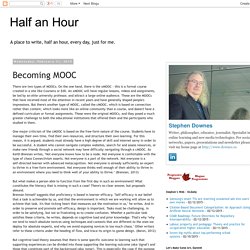
On the one hand, there is the xMOOC - this is a formal course created in a site like Coursera or EdX. You searched for Connectivism - TeachThought. You searched for Connectivism - TeachThought. Connectivism: Bearing a Heavy Node. Published by Convergence Academies, I recently came across this infographic on learning theory on the most excellent blog, TeachThought.
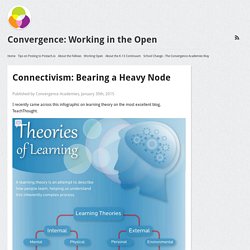
As you can see, with the digital age, a new theory of learning has emerged called Connectivism. it is a theory advanced by George Siemens that is based on the following trends: Many learners will move into a variety of different, possibly unrelated fields over the course of their lifetime.Informal learning is a significant aspect of our learning experience. Formal education no longer comprises the majority of our learning.
Is online education good or bad? And is this really the right question?’ By Eric Fredrickson, the Conversation A common misperception of online education has been that it is an isolating experience for students.
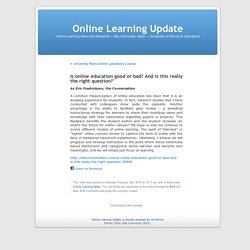
In fact, research studies that I have conducted with colleagues show quite the opposite. Another advantage is the ability to facilitate peer review – a beneficial instructional strategy for learners to share their individual views and knowledge with their classmates regarding papers or projects. This feedback benefits the student author and the student reviewer. MOOCs: Ist das Lehre oder kann das weg? MOOC Workshop. Untitled document. Draw Me: A History of MOOCs. 5 min read Correspondence Courses and the Pre-History of MOOCs I’m currently working on an essay on the pre-history of MOOCs – from correspondence courses to teaching machines and television – for a forthcoming book.

Of course, I’m hardly the first person or the only person to trace the history of “distance learning” through correspondence courses. That’s where David Noble’s incredibly prescient Digital Diploma Mills starts: Thomas J. The parallels between the correspondence courses of the early twentieth century and the MOOCs (their venture-funded variety, I should be clear) are quite indicative of how we have long viewed educational “content delivery,” particularly when developed and delivered by a for-profit enterprise. Take the amount of money spent on marketers versus instructors, for example. For-profit schools weren’t the only ones to provide correspondence coursework, as universities began offering them during the same period.
MOOCs Aren’t Revolutionizing College, but They’re Not a Failure. A few years ago, the most enthusiastic advocates of MOOCs believed that these “massive open online courses” stood poised to overturn the century-old model of higher education.
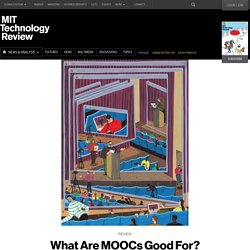
Their interactive technology promised to deliver top-tier teaching from institutions like Harvard, Stanford, and MIT, not just to a few hundred students in a lecture hall on ivy-draped campuses, but free via the Internet to thousands or even millions around the world. At long last, there appeared to be a solution to the problem of “scaling up” higher education: if it were delivered more efficiently, the relentless cost increases might finally be rolled back. Some wondered whether MOOCs would merely transform the existing system or blow it up entirely. Computer scientist Sebastian Thrun, cofounder of the MOOC provider Udacity, predicted that in 50 years, 10 institutions would be responsible for delivering higher education. Learning in an introductory physics MOOC: All cohorts learn equally, including an on-campus class. Kimberly F Colvin1, John Champaign1, Alwina Liu1 (not shown), Qian Zhou2, Colin Fredericks3, and David E Pritchard1 1Massachusetts Institute of Technology, USA, 2Tsinghua University, China, 3Harvard University, USA Abstract We studied student learning in the MOOC 8.MReV Mechanics ReView, run on the edX.org open source platform.
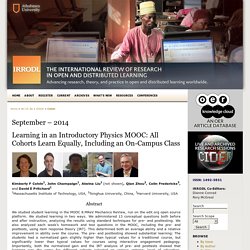
We studied learning in two ways. We administered 13 conceptual questions both before and after instruction, analyzing the results using standard techniques for pre- and posttesting. What Are MOOCs Good For? Bildung 2025: Vier düstere Szenarien (und ein kleiner Lichtblick) - #pb21. Lernen im digitalen Klimawandel – Teil V Foto „Indiana Governor, National Guard respond to tornado destruction [Image 6 of 24]“ von DVIDSHUB unter CC BY 2.0.

Sehen wir den Tatsachen ins Gesicht: Auf dem Feld der Bildung wird sich in den kommenden Jahren viel verändern. Und es wird nicht davon abhängen, dass sich alle nachdenklichen Akteure nach einer gründlichen Diskussion auf vernünftige Eckpunkte verständigen. The strengths and weaknesses of MOOCs: Part 2: learning and assessment. What I’ve learned in my first week of a dual-layer MOOC (DALMOOC) This last week we launched our open course on Data, Analytics, and Learning on edX.
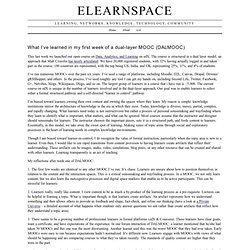
The course is structured in a dual layer model, an approach that Matt Crosslin has nicely articulated. We have 20,000 registered students, with 32% having actually logged in and taken part in the course. 180 countries are represented, with the top being US, India, and UK, representing 25%, 11%, and 4% of students. I’ve run numerous MOOCs over the past six years. Einführung in das Tagesthema: “MOOCs – mehr als eine Modeerscheinung?” What is a MOOC? Constructivism and Eliminative Materialism. A few months ago Stephen Downes and I discussed Constructivism and Materialism. -------------------------------------------- Stephen Downes We don't reason over perceptions or construct meaning, etc- there's no mechanism to do that - rather, we gradually become better recognizer The basic constructivist premise (and I mean constructivists generally, not just those working in education) is that learning and discovery proceeds by the creation or models or representations off reality, and then carrying out operations in these representations.
Are massive open online courses here to stay? They are the new kids on education’s block and most have only been around for a matter of months. Yet massive open online courses, or Moocs, are already starting to tread on the toes of the traditional degree. Where once Mooc providers offered a smorgasbord of courses lasting only a few weeks, taking in every subject you could think of and a few more you had not, Moocs are now being bundled into longer modules, and these are starting to be recognised by universities and employers as bona fide qualifications. With a leading Mooc platform now offering an online masters in computer science and US universities tentatively accepting Moocs as credit, how long will it be before you can take a full bachelor’s degree without ever setting foot on campus?
This is not what the founders of Moocs had in mind when they first experimented with uploading a few lectures and some basic course materials, and there are good reasons why the University of Mooc will not supplant the bricks-and-mortar version. MOOC-Subversion statt MOOC-Revolution - Lost and Found. The MOOC revolution is indeed over. The other day, after posting my last post here, I got into a friendly Twitter argument with the MOOC expert and future academic legend Rolin Moe. I, following conventional wisdom, noted that the MOOCs are as dead as doornails and pushing up the daisies. Rolin on the other hand noted that all the major MOOC providers have gotten more VC funding in just the last couple of weeks. Yesterday, I noticed that Jeff Selingo (a guy who I’m kind of obliged to say nice things about since he’s the person who invited me to join Chronicle Vitae) went Rolin one better.
“The Revolution Isn’t Over,” the title of this piece tells us: In the news media, MOOCs had gone from being higher education’s savior to a bust in a little more than a year.That doesn’t mean MOOCs are dead, however. Sounds a bit like a #Slatepitch, doesn’t it? eLearning Papers Special Edition: learning anywhere, Opening up Education and the promise of MOOCs. Open technologies allow all individuals to learn, anywhere, anytime, through any device, with the support of anyone. Open educational resources, and especially MOOCs, provide alternative ways for students to gain new knowledge. They can also enhance learners’ ability to think creatively to select and adapt a paradigm to solve the problem at hand. Production of good quality MOOCs requires a lot of work and expertise. The flipped classroom method benefits from the availability of open learning resources but requires change of attitude and new skills for teachers.
Digital University soll Lehre an klassischen Unis verändern. MOOCs Completion Rates and Possible Methods to Improve Retention – A Literature Review. MOOCs are really a platform. We can officially declare massive open online courses (MOOCs) as the higher education buzzword for 2012. Between Coursera, edX and smaller open course offerings, nearly $100 million in funding has been directed toward MOOCs in that past 8 months.
Newspapers from NYTimes to Globe and Mail to publications such as the Chronicle of Higher Education, TV programs such as NPR, radio programs such as CBC, and a few hundred thousand blog posts have contributed to the hype. In higher education, there is joyful abundance of opinions on the topic, ranging from breathless proclamations of their disruptive potential to general dismissal of any value. I’ve captured numerous articles here on diigo. Largely lost in the conversation around MOOCs is the different ideology that drives what are currently two broad MOOC offerings: the connectivist MOOCs (cMOOCs?)
Lernen in der Cloud: Was steckt heute dahinter? “Corporate MOOCs will be the big trend in 2014” schrieb vor einigen Monaten der kanadische Bildungsexperte George Siemens. The Hope and Hype of MOOCs. MOOC, Digital Storytelling and Educational Technology. Social Experiment? Learning Experience? Tempest in a Teapot? Coursera's recently under-reported soap-opera. Well, I am not quite sure what to make of this just yet, but I am keeping an eye on the situation to see how it gets resolved. What situation am I talking about? The seemingly under-reported (or not reported at all) situation happening in the course Teaching Goes Massive: New Skills Required, which is offered by Paul-Olivier Dehaye of the University of Zurich.
I have to say that initially the course description did not draw me in because anyone who claims that they will teach you about MOOC teaching is either naive, or selling snake-oil since the developments are so new. I would prefer an approach, like a collaborative exploration (pioneered by a colleague), or something like #rhizo14 on the topic. In any case, I re-read the description (below) and decided that I had 3 weeks to devote to the course. The course grew out of the author's experiences as an early adopter and advocate of newer technologies (such as Coursera) for online teaching. Week 1 went well enough. Udacity CEO Sebastian Thurn is rolling out online education nanodegrees for MOOCs. Photographer: David Paul Morris/Bloomberg Sebastian Thrun, co-founder and chief executive officer of Udacity Inc., is betting that credentialing can improve the viability of online education. Udacity CEO Sebastian Thurn is rolling out online education nanodegrees for MOOCs.
Will SOOCs eat MOOCs for breakfast? Linkis.com - Share links and collect opinions. Quality and benchmarking in open learning, OER and UGC. The Future Of Online Ed Isn't Heading Where You Expect : NPR Ed. MOOCs’ disruption is only beginning. Wie sollen sich MOOC finanzieren? © Fritz Beck. Social Entrepreneurship: Wie sollen sich MOOC finanzieren? ~ Stephen's Web. MOOCs – wenn das Lernen digital und öffentlich wird. Selbstversuch Massive Open Online Course: Ein Kurs im virtuellen Klassenzimmer. Bremer_moocs_unternehmen_wub_2013.pdf. The MOOC of One. CHECK.point-elearning › A book about education stuff, moocs, etc. Ein Wort - zwei Welten oder: die erste Woche in meinen #MOOCs. The Innovative Instructor. Why Design a xMOOC / cMOOC Hybrid? LTCA Theory. Gute MOOCs - böse MOOCs? Openness als Killerkriterium - re:publica ... Designing a Dual Layer cMOOC/xMOOC.
MOOCs: Charles Severance at TEDxKalamazoo. MOOC Discourses.